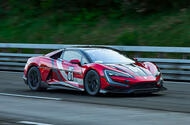How Did the Yangwang U9 Smash the Electric Car Speed Record?
If you’ve ever wondered just how far electric cars can go—literally—let’s talk about the Yangwang U9 Track Edition. This Chinese supercar just clocked a jaw-dropping 293.54mph at the ATP test track in Germany, shattering the previous record for electric vehicles. For context, that’s faster than some small aircraft take off. The previous record holder, the Aspark Owl, managed 272.61mph, which now seems almost modest by comparison.
What’s Under the Hood (or Floor) of the U9 That Makes It So Fast?
Here’s where things get wild. The U9 Track Edition isn’t just a slightly tweaked version of the standard car—it’s a beast all its own. Each wheel has its own motor, and each motor delivers a staggering 744bhp. Add that up, and you’re looking at a total output of 2977bhp. That’s more than double the horsepower of many Formula 1 cars.
But raw power is only part of the story. The U9’s secret weapon is its independent torque-vectoring system. This tech, controlled by a web of road-monitoring sensors, can adjust each motor up to 100 times per second. The result? Maximum grip, razor-sharp handling, and the ability to put all that power down without turning the tires into smoke.
How Did They Keep the Car on the Track at Nearly 300mph?
Hitting these speeds isn’t just about horsepower. At almost 300mph, every detail matters—especially the tires. For this record attempt, the U9 wore specially developed semi-slicks from Giti Tire. These weren’t your average performance tires; they were engineered to minimize torque loss and resist the extreme wear that comes with such high speeds.
And let’s not forget the driver. Marc Basseng, a seasoned German professional, was behind the wheel. He’s no stranger to speed records—he set a previous record in 2024 with the same car, reaching 243mph. That run already made the U9 the fastest non-airborne Chinese vehicle ever, even outpacing China’s famous high-speed trains.
What Does This Mean for the Future of Electric Supercars?
The Yangwang U9’s achievement isn’t just a headline—it’s a signal that electric supercars are entering a new era. For years, critics argued that EVs couldn’t match the drama or performance of their gasoline counterparts. That argument’s looking pretty shaky now.
Yangwang, owned by automotive giant BYD, is positioning itself as a leader in tech-heavy, high-performance vehicles. The U9 is joined by the U8 SUV in China, with prices starting around £120,000 for the U9 and £200,000 for the U8. These aren’t just cars for the local market, either. BYD’s vice-president, Stella Li, recently confirmed plans to bring the Yangwang brand to Europe, following the launch of their Denza brand.
Are These Record-Breaking EVs Practical for Everyday Drivers?
Let’s be real—most of us aren’t going to be hitting 293mph on our morning commute. But the technology developed for cars like the U9 often trickles down to more accessible models. Torque-vectoring, advanced tire compounds, and high-output electric motors are already making their way into mainstream EVs, improving safety, handling, and efficiency.
Plus, these headline-grabbing achievements help shift public perception. Electric cars aren’t just about saving fuel—they’re about pushing the boundaries of what’s possible on four wheels.
What’s Next for Yangwang and the World of High-Performance EVs?
If the past few years are any indication, we’re just getting started. As battery technology improves and manufacturers race to outdo each other, we can expect even more mind-bending performance from electric supercars. And with brands like Yangwang eyeing the European market, the competition is only going to heat up.
The takeaway? The electric car revolution isn’t just about going green—it’s about going fast. And right now, nobody’s going faster than the Yangwang U9.

